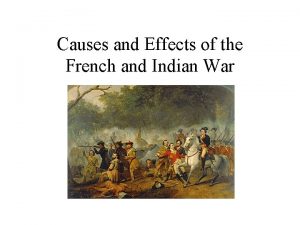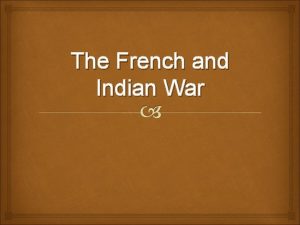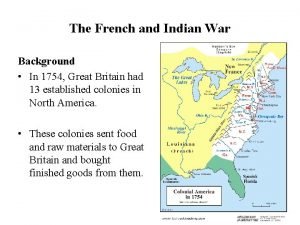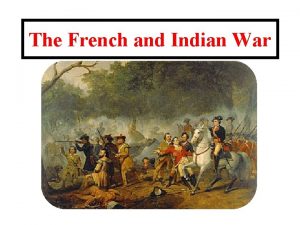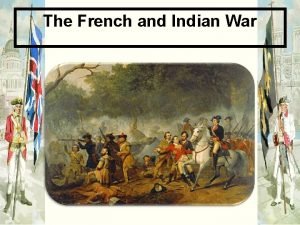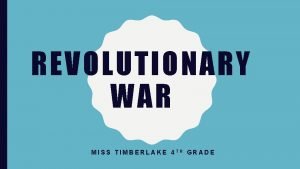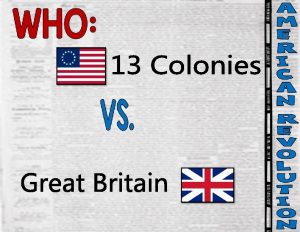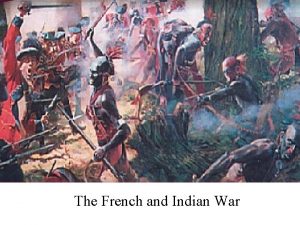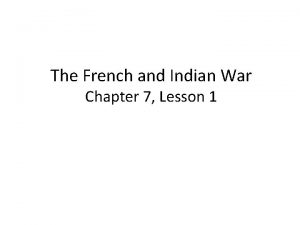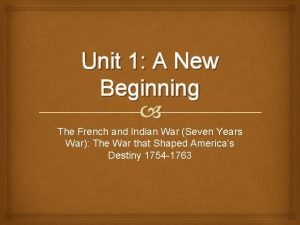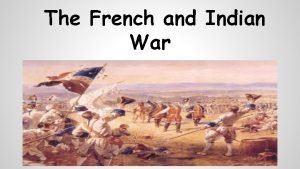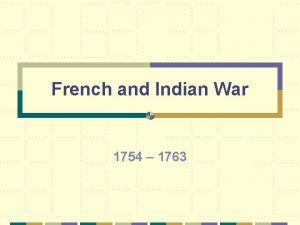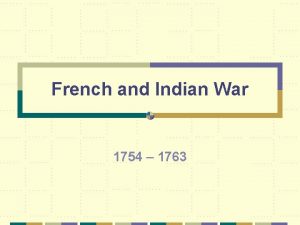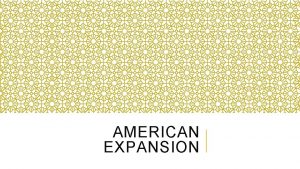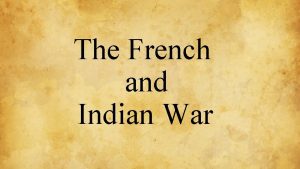The French and Indian War Frances North American












- Slides: 12

The French and Indian War

France’s North American Empire • • Jacques Cartier explores the St. Lawrence River in 1534. Leads to the establishment of New France. French colonists primarily concerned with the fur trade and developed friendly relations with the native tribes. Fashionable top hats made from beaver skins were extremely popular in Europe and were a sign of status.

Britain Defeats an Old Enemy Growing French Empire will conflict with growing British Empire in North America. Conflict of interest over the Ohio territory would lead to what is known as the French Indian War starting at Fort Necessity in 1754. Despite numerical supremacy, English forces suffered numerous initial defeats. France allied with friendly Native American tribes.

Pitt and the Iroquois Turn the Tide King George II appoints William Pitt to command the British army. Powerful Iroquois tribe joins with the British defeated the French in 1759 on the Plains of Abraham just outside of Quebec. War officially ends in 1763 with the Treaty of Paris. England would now control all territory in North America East of the Mississippi River. Spain would control all land West of the Mississippi.

Territorial Consequences

Chief Pontiac “When I go to see the English commander and say to him that some of our comrades are dead, instead of bewailing their death, as our French brothers do, he laughs at me and at you. If I ask for anything for our sick, he refuses with the reply that he has no use for us. From all this you can well see that they are seeking our ruin. Therefore, my brothers, we must all swear their destruction and wait no longer. ”

Victory Brings New Problems • • • Natives recognize that French defeat was a defeat for them too. Led by Pontiac, Native Americans captured eight British forts in the Ohio River Valley. British give smallpox-infected blankets to two Delaware chiefs during peace negotiations. Weakened by disease and war most native groups negotiated treaties with the British. Britain issues the Proclamation of 1763 which bans all colonial settlement west of the Appalachians.

Colonies and Britain Grow Apart Proclamation of 1763 sought to halt westward expansion and angered the colonists. Stationing of 10, 000 English troops angers colonists who fear that they may turn on them. Writs of Assistance allowed British officials to search ships and buildings to guard against smuggling. Sugar Act- attempts to help pay England’s debt from the war-further infuriates colonists.

Overview of Colonists 1. Risk takers. -independent, less accepting of traditional establishment. 2. Conditions of life in N. America-more people owned land. this meant they were invested in the community and could vote. larger franchise in America than England. about 20% of land holding white men could vote in England. 60 -80% in the colonies by 1760. 3. Less confined by class structures. Midling society. 4. Ethnic and religious diversity. 5. Great Awakening-encourages free will. People could change their lives for the better. Democratizing force. preached equality. 6. Better living conditions-more space, food. Avg. size of Englishman mid-18 th century was 5. 6 and woman 5. 0. Colonial men and women a couple of inches taller. 7. Colonies had in place their own institutions of govt. (mid-18 th Century)

Overview of Colonists (continued) Amount of time from Jamestown to U. S. Revolution is about the amount of time from Declaration of Independence to WWII. There are now several generations of colonists who have lived and died in the colonies having never been to England. no longer british colonists but now British Americans. Between 1700 and 1770 population goes from 200, 000 to over 2 million. every decade population growth increases 30 -40% Colonists identified themselves as being part of the great British Empire. Proud to be British. Part of empire which granted its citizens more liberties than any other on earth. Felt the most British after the defeat of the French in the French Indian war. Saw themselves as British subjects who deserved the rights of a british subject no just a colonist living on the peripheries of the British Empire, Lived on edge of a “great howling wilderness. ” They worried about how they rated in comparison with people living in England. Had an inferiority complex. Embarrased by their speech, architecture, intellectual life. England looked down on them as country

Arrogant British Quotes "American colonists may try to ape British habits and customs but they're no more then ruffled dunces" "American colonists are a most rude, depraved, degenerate race, and it is a mortification to us that they speak english and can trace themselves from that stock. "

Had the colonists forfeited some of their English liberties by migrating to the New World? Were they part of the mother country or were they just contributors to the greater empire? Colonists would argue they had left England with permission of the monarch and had taken a lot of risk to create a thriving English settlement at little cost to the English government bringing England great riches in the process. They tamed the wilderness for England. They deserved full rights as Englishmen. They were most "English" when they rebel.
 Causes and effects of the french and indian war
Causes and effects of the french and indian war Where did the french and indian war take place
Where did the french and indian war take place Cause of french and indian war
Cause of french and indian war Causes of french and indian war
Causes of french and indian war French and indian war summary
French and indian war summary French and indian war
French and indian war Brainpop french and indian war
Brainpop french and indian war British debt after the french and indian war
British debt after the french and indian war What year did george washington attacks ft necessity
What year did george washington attacks ft necessity North america 1754
North america 1754 French and indian war
French and indian war French and indian war
French and indian war A new beginning in french
A new beginning in french
